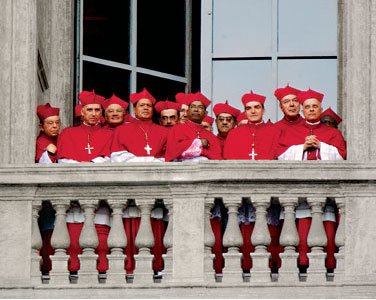
The Vatican is considering calls from cardinals to hold a papal conclave earlier than planned, after Pope Benedict XVI steps down on February 28.
Catholic Church officials want a successor to be in place before the start of Holy Week on March 24 – the most important event in the Christian calendar.
Under current rules, the vote cannot be held before March 15, to give cardinals enough time to travel to Rome.
The Vatican is now examining the possibility of changing the rule.
According to the Holy See’s constitution, a 15-20 day waiting period must be observed after the papacy becomes vacant.
The rule is in place to allow “all those [cardinals] who are absent” sufficient time to make the journey to Rome, Vatican spokesman Federico Lombardi said.
But the prospect of bringing forward the date had been raised by a number of cardinals, he added.
And given that they already knew when Pope Benedict was stepping down, they would have plenty of time to plan their trip.
“It is possible that church authorities can prepare a proposal to be taken up by the cardinals on the first day after the papal vacancy,” Federico Lombardi said.
The rules on papal succession were open to interpretation and “this is a question that people are discussing”, he said.
Officials in charge want to ensure that Pope Benedict’s successor is installed well in time for the liturgical celebrations at Easter, the most important date in the church’s calendar.
As there is no precedent in modern times for the resignation of a pope, ecclesiastical lawyers are having to re-examine very carefully the rules for papal elections laid down in past centuries and updated most recently by Pope Benedict himself, our correspondent explains.
Some of the 117 Cardinal electors from around the world who will choose the next pope in a secret ballot in the Sistine Chapel are expected to begin arriving in Rome as early as next week, he says.
As soon as there is a quorum, they will decide on a date to begin their conclave. In order to be elected, the new pope will need a majority of two thirds plus one vote.
Pope Benedict XVI was elected after only four ballots in 2005.
The 85-year-old pontiff announced his shock resignation last Monday, citing his advanced age as the reason for stepping down.
Pope Benedict is expected to spend his retirement in a monastery at the Vatican.
Last week, Pope Benedict hinted he would withdraw into seclusion at the end of this month.
“Even if I am withdrawing into prayer, I will always be close to all of you… even if I remain hidden to the world,” he told a meeting of priests in Rome.
The last pontiff to resign was Pope Gregory XII, who quit in 1415 amid a schism within the Church.